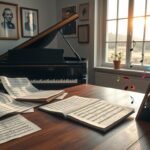Creating your own Original Music For Beginners can be very rewarding and empowering, especially if you’re just starting out. This article is here to help you with tips and insights to make your own music. It’s perfect for anyone who wants to explore their creative side.
Also Read: How To Learn To Play The Guitar For Beginners?
Key Takeaways
- Understand the basics of music composition and how to use them well.
- Build a strong base by learning key musical elements and techniques.
- Find inspiration and learn to turn it into your own music ideas.
- Find ways to improve your music writing and bring your ideas to life.
- Enjoy the process of making music and celebrate your unique style.
Understanding the Basics of Musical Composition
Musical composition is the art of creating music by mixing different elements like melody, harmony, rhythm, and texture. It’s about making choices to express a mood, emotion, or idea. It’s not just about being new or different, but also about using what’s already known to create something unique.
Also Read: Analyzing The Role Of Harmony In Contemporary Pop Music
Composers learn from others and develop their own style. For beginners, knowing the basics of music theory is key to making their own music. Understanding what musical composition is and its main parts helps them start creating meaningful music.
What is Musical Composition?
Musical composition is about putting different musical elements together to make a complete piece of music. Composers choose the melody, harmony, rhythm, and texture to match a mood or story. They get inspiration from many places to make their music stand out.
The main parts of music composition are:
- Melody: The main tune that people remember most.
- Harmony: The chords that support the melody.
- Rhythm: The pattern of sounds and silences that give the music its beat.
- Texture: The overall sound of the music, from simple to complex.
Knowing these basics lets beginners start making their own music. They can use their music theory knowledge and creativity to create something new.
Also Read: The Impact Of Classical Music On Cognitive Development
Developing a Solid Foundation

Starting to compose music can feel overwhelming, especially for beginners. It seems like there’s so much to learn. But, it’s key to focus on melody, harmony, and form. These areas are vital for making music that flows well and touches the heart.
Learning compositional techniques one skill at a time helps beginners. This way, they can improve their musical ideas step by step. Knowing how the core elements of music work together is key. It helps in creating original pieces that evoke emotions.
- Learn the basics of essential composition skills. This includes writing melodies, making chord progressions, and playing with rhythms.
- Get to know the fundamentals of musical structure. This includes understanding form, how to phrase music, and how different elements work together.
- Try out different compositional techniques to find what makes your music unique.
Also Read: How To Write Music?
| Compositional Technique | Description | Example |
|---|---|---|
| Melody Writing | Crafting memorable, expressive melodic lines that capture the essence of your musical ideas. | Incorporating stepwise motion, leaps, and rhythmic patterns to create a compelling melodic phrase. |
| Harmonic Progression | Exploring the use of chords and their relationships to build a harmonic foundation for your composition. | Experimenting with different chord voicings, inversions, and modulations to create a rich and dynamic harmonic landscape. |
| Rhythmic Patterns | Developing a strong sense of rhythm and incorporating diverse rhythmic elements into your musical ideas. | Utilizing syncopation, polyrhythms, and varied note durations to create a captivating rhythmic foundation. |
By focusing on these key composition skills, beginners can lay a strong foundation. This will help them make cohesive and expressive musical works.
Finding Inspiration and Building Ideas

Starting to make music often means looking at the work of famous composers and musicians. Hearing different musical styles helps beginners see what they like and want to add to their music. Looking at how famous composers use melody, harmony, and rhythm can spark new ideas.
Also Read: Top Benefits Of Music Education For Kids: Why Every Child Should Learn Music
Listening to Other Composers
Even though making your own music is the main goal, it’s okay to take ideas from others and make them your own. Learning from the best is key to finding your own unique sound. By analyzing musical styles and incorporating ideas from other composers, you can find lots of inspiration for your music.
Pablo Picasso once said that learning from others is crucial. Composers at any level can gain a lot by studying the work of others. This helps them in their own creative journey.
Original Music For Beginners

Starting to compose your own music can feel tough at first, but it’s definitely doable. This guide will help you begin making your own music. We’ll cover picking a style, creating melodies, and building harmonies.
Begin by focusing on one part of music at a time. Start with a catchy melody. Play with different versions of a simple idea to make it interesting. After you have your melody, think about the chords that will go with it.
Adding dynamics and how you play the notes can also make your music stand out. Try changing the volume and how fast or slow you play to see what feels right. Keep trying different things until you find what you like best.
The main thing is to enjoy the process and not worry too much about being perfect. Remember, making music is a journey, not a race. By trying new things and celebrating your successes, you’ll get better and more confident in your music-making skills.
| Technique | Description |
|---|---|
| Working on one element at a time | Start with developing a strong melody, then build a harmonic structure to support it. |
| Experimenting with variations | Try different alterations and combinations of a simple motif to create a cohesive piece. |
| Incorporating dynamics and articulations | Explore how changes in volume, tempo, and note articulation can transform the character of the music. |
“Composing original music is a journey, and the key is to focus on steady progress rather than expecting immediate mastery.”
Developing Your Compositional Process

Starting to make your own music means building a solid way to compose. A good idea is to work on your music in parts, not all at once. This lets you improve each musical part like the melody, harmony, or rhythm before putting them together.
Writing One Part at a Time
Breaking your music into smaller parts makes it easier to spot and fix problems. It also keeps your creative flow going. This way, you get to see how different parts work together, making your music richer and more meaningful.
- Start with a catchy melody, then add harmonies and rhythms on top.
- Try out different chord progressions and how instruments sound together to make your music more interesting.
- Work on the rhythm and how the music moves to make it engaging and unified.
Remember, the compositional process for beginners is about trying new things and finding what suits you. By writing music in sections and using various techniques, you can make a creative process that brings your ideas to life.
Conclusion
Starting to compose music is a deeply rewarding journey for beginners. It’s about learning the basics of music and building your skills. With the right steps, you can make your own unique music.
This article has given you a guide to start with. It helps you share your feelings and ideas through music. The path to becoming a great composer might seem hard, but it’s all about learning and improving.
With hard work and the right approach, you can unlock your creative side. You can share your musical ideas with the world. This article offers great tips to help you begin your musical composition journey.
The journey of a composer is never-ending. It’s about always learning and growing. By trying new things and working with others, you can expand your creativity. Don’t be afraid to challenge yourself and let your music be heard.
FAQs
Q: What are some effective tips to compose music for beginners?
A: Beginners should start by listening to the music they love, experiment with their digital audio workstation (DAW), and focus on learning how to compose simple melodies and chord progressions.
Q: How can I start writing melodies for my first piece?
A: Start by playing an instrument or using notation software like Sibelius. Create short melodic phrases and gradually build them into a longer piece, focusing on musical form.
Q: What should I know about chord progression when composing music?
A: Understanding chord progression is key to creating harmony. Familiarize yourself with common progressions in various styles of music to see how they support melodies.
Q: Is it necessary to learn how to read music when composing?
A: While it’s not strictly necessary, learning to read music can significantly help you in the process of composing by allowing you to transcribe your ideas and communicate them more effectively.
Q: What tools can I use to help me compose music?
A: A digital audio workstation (DAW) is essential for composing and arranging music. You can also use music notation software like Sibelius for writing scores and MIDI instruments for playback.
Q: How can I improve my musical form in compositions?
A: Study different musical forms used in classical music and contemporary styles. Analyze pieces you love and try to replicate their structures in your own compositions.
Q: What are some common mistakes to avoid when getting your music out there?
A: Avoid rushing the process of composing and sharing your music. Take time to refine your pieces, seek feedback, and ensure your work is polished before presenting it to others.
Q: How can I harmonize my melodies effectively?
A: To harmonize melodies, experiment with different chord progressions and try adding additional voices or instruments to create depth. Learning about orchestration can also help in this aspect.
Q: Can I compose music without knowing how to play an instrument?
A: Yes, you can compose music using software and MIDI instruments without traditional instrument skills. However, learning to play an instrument can enhance your understanding of music theory and improve your compositions.
Q: What is the best way to learn how to compose original music?
A: The best way to learn how to compose is through practice and experimentation. Use resources like online courses, books on music history, and tips and tricks from experienced composers to guide you.




